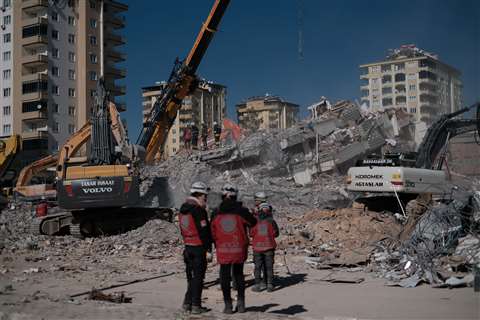Turkey issues arrest warrants over collapsed buildings
13 February 2023
Turkey has ordered the arrest of more than 100 people suspected of bearing criminal responsibility for the collapse of buildings during the country’s recent catastrophic earthquakes.
 Rescue operarions at a collapsed building in Gaziantep in southern Turkey. Photo: ReutersConnect
Rescue operarions at a collapsed building in Gaziantep in southern Turkey. Photo: ReutersConnect
At a press briefing on Saturday, vice president Fuat Oktay said, “Detention orders have been issued for 113 of them.
“We will follow this up meticulously until the necessary judicial process is concluded, especially for buildings that suffered heavy damage and buildings that caused deaths and injuries.”
As reported by Aljazeera, Turkey’s environment minister Murat Kurum said almost 25,000 buildings had collapsed or been heavily damaged during the two earthquakes, which struck both Turkey and northern Syria on Monday, February 6.
Experts have said the death toll, which has already risen to more than 33,000 across all regions, could potentially double, as freezing conditions – as well as access and security issues in Syria – continue to hamper rescue missions.
Earthquake engineering measures
Turkey’s current construction codes were updated in 2018, requiring structures in earthquake-prone regions to be built with high-quality concrete reinforced with steel bars.
Additionally, columns or beams should be introduced to these structures, allowing them to absorb the impact of quakes.
The Turkish government is suggesting that some contractors have not implemented these measures and has vowed to punish those responsible.
The two major earthquakes that struck the country last week measured 7.8 and 7.5 on the magnitude scale, flattening buildings or causing them to collapse on their sides.
Technically, buildings constructed using modern earthquake-proofing measures should be able to withstand earthquakes of this size, yet it is clear from images coming from the devastation zones that even the newest apartments have crumbled or collapsed down in a pancake fashion.
As reported by the BBC, Professor David Alexander, an expert in emergency planning and management at University College London, said, “The maximum intensity for this earthquake was violent but not necessarily enough to bring well-constructed buildings down.
“In most places the level of shaking was less than the maximum, so we can conclude out of the thousands of buildings that collapsed, almost all of them don’t stand up to any reasonably expected earthquake construction code.”
Last week, the Turkish Contractors Association (TMB) called for its members to mobilise their construction equipment and aid the rescue mission.
STAY CONNECTED



Receive the information you need when you need it through our world-leading magazines, newsletters and daily briefings.
CONNECT WITH THE TEAM








